The development of US imperialist policy took a significant step forward during the presidency of Theodore Roosevelt (1901-09). Although the United States had intervened in Cuba in 1898 in response to the challenge to its interests posed by the Cuban revolutionary war of independence, non-intervention continued to be the norm that guided US foreign policy. But “Rooseveltbroke with this tradition and promoted interventionism without reserve”(Arboleya 2008:73). As the Cuban scholar Roberto Regalado has written: “During Roosevelt’s term in office, Washington sponsored the forcible secession of Panama (1903), enabling it to refuse to recognize the Columbian Congress’s rejection of the proposal to construct the Panama Canal; intervened militarily in the Dominican Republic (1904), which led to control over that country’s customs policy (1905-12); occupied Cuba for the second time (1906-09); sent in the marines in order to obtain political dividends in the wars that broke out between Guatemala and El Salvador (1906) and between Honduras and Nicaragua (1907); and applied interventionist policies that led to the resignation of President Santos Zelaya in Nicaragua (1909)" (Regalado 2007:116-17).
The imperialist policies of Theodore Roosevelt continued under his successor, William Howard Taft (1909-13). Taft adopted different rhetoric, replacing Roosevelt’s “big stick” with “dollar diplomacy,” thus promoting a policy of facilitating US economic and financial penetration through the buying of politicians in the neocolony (Arboleya 2008:74-75). But the military interventions and aggressive policy continued, with military interventions in Honduras and Nicaragua and threats designed to hinder the Mexican Revolution (Regalado 2007:117).
The foreign policy of Woodrow Wilson “was equally expansionist in relation to the Caribbean and Central America, and he developed a policy as interventionist as his predecessors” (Arboleya 2008:82). Although he was critical of “dollar diplomacy” due to its ethical implications, he expressed a similar view when he affirmed that dollars “ought to be reserved for the ministers of the state, even if the sovereignty of the reluctant nation is mistreated in the process” (quoted in Arboleya 2008:82). In addition, military interventions continued, consistent with the policies of Roosevelt and Taft. Between 1913 and 1921, under the pretext of “promoting democracy” and “stopping German intervention,” the US government interfered in Mexican international affairs, occupied Haiti (1915-34) and the Dominican Republic (1916-24), intervened in Panama (1918), and supported coups d’état and dictatorships in Central and South America (Regalado 2007:117).
Wilson, however, developed a more advanced ideological formulation of imperialism. Roosevelt and Taft had proclaimed imperialist policies to be consistent with the values of democracy and freedom, but in the implementation of the policy, the emphasis was on the application of military force (the “big stick”) and economic pressure (“dollar diplomacy”). But Wilson sought to establish a new international order on a foundation of US political values, thus facilitating greater global acceptance of US intervention and economic penetration and reducing the need for the application of force and pressure. As Arboleya has written, Wilson believed that US national interests would be served best by “the establishment of an international order that would universalize North American political values. A mixture of divine mission, democratic crusade, and expansionist will constituted the ingredients of this international project, which in reality was no more than a modernized version of ‘manifest destiny’” (2008:82).
However, national and international conditions had not yet arrived at a point that would enable the implementation of the Wilsonian vision. Following World War I, Wilson encountered opposition from Britain and France, who objected to those components of Wilson’s policy that would involve a reduction of their spheres of influence. The United States was not yet able to impose international rules of conduct on the nations of Western Europe. At the same time, Wilson’s goals for the post-war era also encountered opposition in the United States. US capitalism and political culture had not yet developed sufficiently, and important sectors of the capitalist class were not convinced that the “new world order” proposed by Wilson would provide sufficient guarantees for the protection of their capital. The US government therefore did not enter the League of Nations that had been promoted by Wilson (Arboleya 2008:82-86).
The presidential administrations of Warren Harding (1921-23), Calvin Coolidge (1923-29), and Herbert Hoover (1929-33) continued US imperialist policies toward Latin America, supporting military dictatorships in order to constrain popular struggles in opposition to the neocolonial system, and initiating new interventions in Panama, Honduras, and Nicaragua (Regalado 2007:118).
We are beginning to see a phenomenon that is emphasized in the Third World perspective: the continuity of US foreign policy during the twentieth century, regardless of shifts in rhetoric or changes in political party, as an interventionist imperialist policy, in violation of the internationally accepted principle of the sovereignty of all nations.
References
Arboleya, Jesús. 2008. La Revolución del Otro Mundo. La Habana: Editorial de Ciencias Sociales.
Regalado, Roberto. 2007. Latin America at the Crossroads: Domination, Crisis, Popular Movements, and Political Alternatives. New York: Ocean Press.
Key words: Third World, revolution, colonialism, neocolonialism, imperialism, democracy, national liberation, sovereignty, self-determination, socialism, Marxism, Leninism, Cuba, Latin America, world-system, world-economy, development, underdevelopment, colonial, neocolonial, blog Third World perspective, Theodore Roosevelt, Woodrow Wilson






 RSS Feed
RSS Feed





